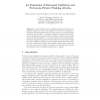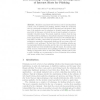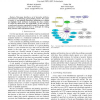93
Voted
ACSAC
2006
IEEE
15 years 8 months ago
2006
IEEE
Many anti-phishing schemes have recently been proposed in literature. Despite all those efforts, the threat of phishing attacks is not mitigated. One of the main reasons is that p...
106
Voted
FC
2007
Springer
15 years 9 months ago
2007
Springer
We argue that phishing IQ tests fail to measure susceptibility to phishing attacks. We conducted a study where 40 subjects were asked to answer a selection of questions from exist...
96
Voted
FC
2007
Springer
15 years 9 months ago
2007
Springer
Abstract. In this usability study of phishing attacks and browser antiphishing defenses, 27 users each classified 12 web sites as fraudulent or legitimate. By dividing these users...
103
Voted
CCS
2007
ACM
15 years 9 months ago
2007
ACM
We propose BeamAuth, a two-factor web authentication technique where the second factor is a specially crafted bookmark. BeamAuth presents two interesting features: (1) only server...
120
Voted
ACSAC
2008
IEEE
15 years 9 months ago
2008
IEEE
Many anti-phishing mechanisms currently focus on helping users verify whether a web site is genuine. However, usability studies have demonstrated that prevention-based approaches ...
105
click to vote
FC
2009
Springer
15 years 9 months ago
2009
Springer
Attackers compromise web servers in order to host fraudulent content, such as malware and phishing websites. While the techniques used to compromise websites are widely discussed a...
108
Voted
AIMS
2009
Springer
15 years 9 months ago
2009
Springer
Abstract. This paper presents a proposal for scalable detection and isolation of phishing. The main ideas are to move the protection from end users towards the network provider and...
119
Voted
NCA
2009
IEEE
15 years 9 months ago
2009
IEEE
Abstract—This paper describes a set of innovative attributebased checks for defending against phishing attacks1 . We explain a number of anti-phishing algorithms implemented as p...




